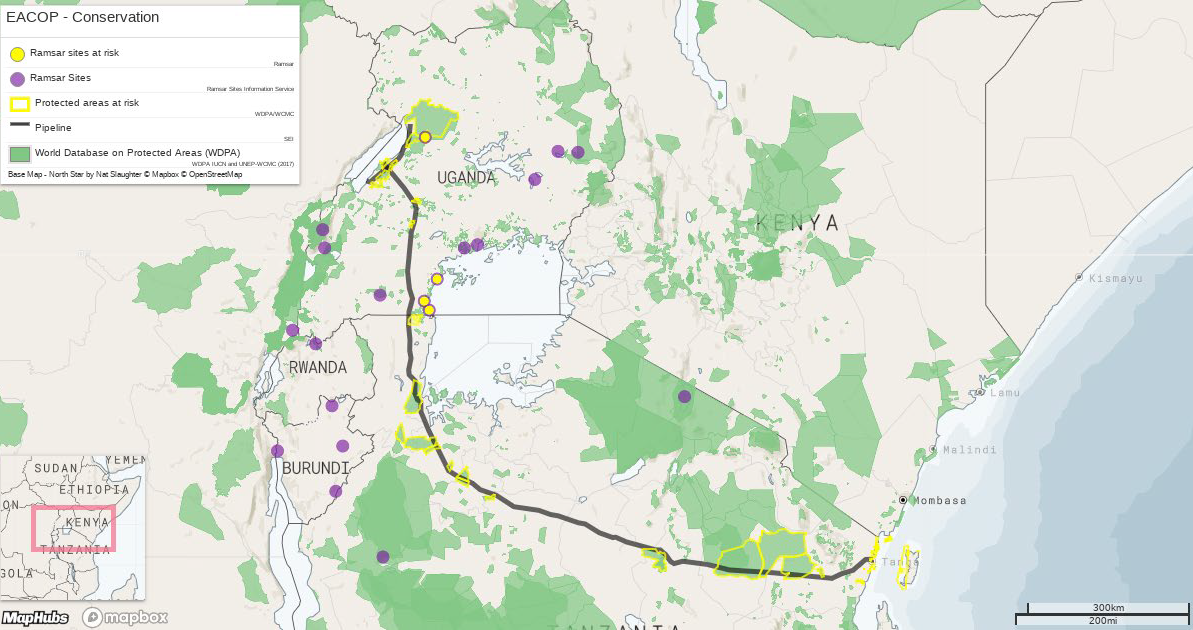In 2006, Uganda discovered what turned out to be 1.7 billion barrels of recoverable commercial oil in the Albertine Graben Region. Since then, different activities relating to the exploration and potential utilization of this oil have taken place. On February 1, 2022, the project partners, French multinational oil company TotalEnergies (Total), China National Offshore Oil Corporation, the Uganda National Oil Company, and the Tanzania Petroleum Development Corporation, announced a final investment decision and the launch of the Lake Albert Development Projects representing a total investment of approximately $10 billion. The Lake Albert Development projects consist of two extraction projects: the Tilenga and KingFisher upstream oil projects in Uganda, and the construction of the East African Crude Oil Pipeline (EACOP).

The EACOP is a proposed 1443km pipeline that will transport an estimated 200,000 barrels of crude oil per day from Kabaale, Uganda to the Tanga port in Tanzania, where it will be exported to the international market. In Uganda alone, the pipeline will pass through 10 districts and will take up 2,740 acres of land. This route was selected by the Ugandan government because it was less costly than an alternative route to Lamu in Kenya. In order to transport the waxy crude oil using the pipeline, the pipeline will need to be heated to a temperature of 50°C and if built, the pipeline would be the longest heated crude oil pipeline in the world. According to a report by Survive in Uganda 298 kms will cut through 178 villages and displace 25,000 people. In Tanzania 1,147 kms to port of Tanga, impact 62,000 people from 231 villages and impact 2,000 kms² of nature reserves.
The objectors

The pipeline will cut through a region rich in biodiversity, protected areas and wildlife corridors. In Tanzania it will run through 35 lakes and rivers and the Burigi-Biharamulo game reserve and the Wembe Steppe together with Minziro forest & Swaga Swaga game reserves. There will be a heightened risk of oil spills due to crossing the Rift Valley, one of the world’s most seismically active regions and pipe water usage will increase in areas of water stress.
A marine storage terminal will be built in Chongoleanic Peninsula, 54kms northeast of Tanga port. Marine terminal will be able to serve tankers up to 1 million tonnes of oil in 24 hours. Near ecologically or biologically significant marine reserves including Tanga Coelacanth Marine Park, Pemba-Shimoni-Kisite Reserve and Pemba island, which forms part of Zanzibars archipelago. These fragile ecosystems could be impacted by marine oil export infrastructure if not properly managed.
Factoring in transport, refining, burning of oil, the pipeline will generate up to 34 million tonnes of C0₂ per year, significantly more than the combined emissions of Uganda and Tanzania.
Current State of play
The Ugandan Cabinet has approved the application by the East African Crude Oil Pipeline Company Limited for a license for the construction of the 296 km long East Africa Crude Oil Pipeline in Uganda. The East African Crude Oil Pipeline project will displace at least 118,348 persons (56,460 in Uganda and 61,889 in Tanzania). However, challenges relating to land acquisition due to contestations of valuations by the project-affected persons-PAPs still remain eminent. Notably, on September 15, 2022, the European Parliament passed a controversial “emergency resolution” by a large majority denouncing the consequences of Uganda’s oil projects citing specifically Tilenga and the East African Crude Oil Pipeline. The resolution called for the immediate suspension of drilling activities in the protected and sensitive ecosystem (Murchison Falls National Park) and the postponement of the EACOP project for at least one year to allow a feasibility study of an alternative path to preserve the environment. However, two months later on November 2, 2022, the “emergency resolution” was overturned during the Joint Parliamentary Assembly of the African, Caribbean, Pacific – European Union (ACP-EU) sitting in Maputo, Mozambique. The Assembly voted to let Uganda proceed with developing the Pipeline Project (The Independent 20.01.2023)
Africa’s right to energy self-reliance
Proponents of the EACOP have lauded it for the potential the oil revenue has to boost the economies of landlocked Uganda, and neighbouring Tanzania. According to the official EACOP website, construction and operation of the pipeline will require an investment capital of 3.5 billion USD, and because of this investment, there is the potential for a 60% increase in Foreign Direct Investments for Uganda and Tanzania. Total also estimates that the construction of the pipeline will potentially create 3,800 direct jobs and 20,000 indirect jobs.
Why should the African continent deprive itself of fossil fuels while the West and Asian economies continue to be based on them? Data from Global Energy Monitor shows that Chinas coal fired power plants emit as many tonnes of C02 in 36 hours as Morrocco does in a year. The combined capacity of all gas fired power plants being developed across Africa is 65GW. Vietnam alone if developing 93GW of gas fired power. Following the shift away from Russian gas, Europe is reopening coal powered stations, meanwhile 600 million Africans do not have safe and stable access to electricity.
A Just Transition
Africa which contributes between 3.8-4% of the global greenhouse gas emissions is grappling with significant energy poverty. 80% of Uganda’s energy currently comes from renewable sources whilst Tanzania is in a position to greatly increase her renewable energy sources with current in-country power projects under construction. Approximately 68% of the population in Sub-Saharan Africa has no access to electricity and relies on biomass. The transition these countries need to take is vastly different to developed countries.
There is a valid argument that the global North should have a faster and deeper transition than the rest of the World so poorer developing countries can have an equal chance to grow. Developing countries of the global south must however have an energy transition plan and develop their natural resources, especially fossil fuels in a responsible manner along with acknowledgement of opportunities for continued development of renewable energy sources as we see today with significant hydropower, and solar power energy development in East Africa.
Reading
Survive 2022 EACOP a disaster in the making: Research into Total’s mega pipeline project in Tanzania
The East African Crude Oil Pipeline: Why Are Some East Africans Opposed? MARCH 25, 2022 by Abigail M. Johnson https://www.law.georgetown.edu/
Uganda National Oil Company The East African Crude Oil Pipeline Project and the energy transition debate https://www.unoc.co.ug/
The African Report: Africa has a right to Self-reliance https://www.theafricareport.com/
